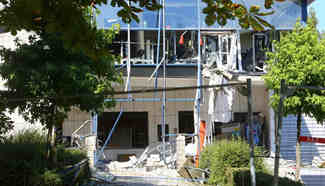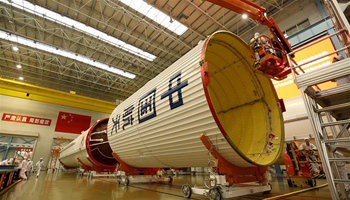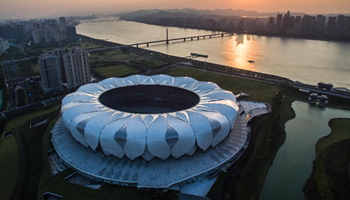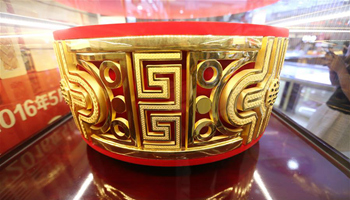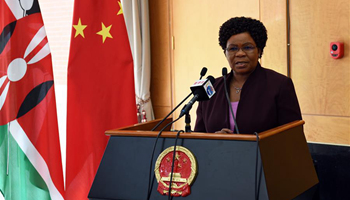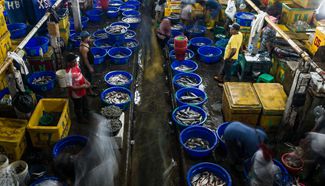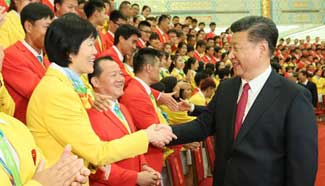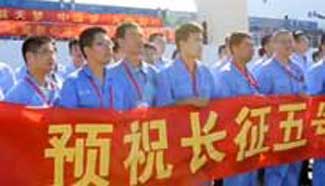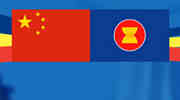by Chris Dalby
RIO DE JANEIRO, Aug. 26 (Xinhua) -- If the numbers told the whole story, Rio 2016 was a complete triumph. A total of 19 world records and 65 Olympic records fell. More female athletes than ever. Billions watching on television around the world. By that count, the Olympics were truly faster, higher, stronger than ever.
The predictions of total collapse did not come close to happening. Sure, the diving pool was invaded by algae, the Olympic Village wasn't fully ready, some volunteers never showed up, some athletes' kits did not arrive on time. Yet, in the manner that has long defined Brazil's appeal, the country took it in stride.
Besides, many of Rio's challenges were not of its own making. The Irish mafia embroiled in a ticketing scandal, the Russian doping problems seeming now as old as the Games themselves, Ryan Lochte's bout of mania. These are the unpredictable realities of the Olympics, which become their unique pressure cooker of ego and expectation.
Sadly, no matter how many facades Rio put up to hide the favelas, Brazil's real problems slipped through the cracks. Athletes and VIPs were mugged, bullets were fired into press tents.
The political and economic turmoil of the last two years may have been quieted for the last two weeks. But less than a week after the closing ceremony, suspended president Dilma Rousseff, who did so much to bring the Games to Rio, is on trial in the Senate.
While shops and hotels in downtown Rio saw a massive uptick in business, the rest of Brazil continues to be gripped by recession, unemployment, inflation and political gridlock.
Interim President Michel Temer wrote this week that the Games had been "an absolute success" and that "pessimists, who predicted...that the Brazilians did not have the capacity to organize and receive Rio 2016" were wrong.
Temer is right. Rio 2016 was a success but that is not in itself a cause of celebration. That was the city and the country's job. The state of Rio ran out of money just before the Games, forcing a federal bail-out. Money to be used to fly in Paralympic athletes from poorer countries was only guaranteed while the Olympics were on.
Concern over Brazil's future is justified. Most senators, according to recent polls, favour impeaching Rousseff, the democratically elected president. There is little love for her replacement as evidenced by cries of "Fora Temer" (Temer Out) being chanted in Olympic venues.
Now, Rio and Brasilia must organize a far greater and more challenging victory. The country that was once leading Latin America out of obscurity has faded. A reduction in crime in years prior to the Games appears to be slipping away. Foreign investors are suddenly missing, a troubling sign as Argentina, Colombia and Bolivia set themselves up as business-friendly alternatives.
But there are signs of hope. The bloody, knockdown political battles that preceded Rousseff's impeachment should dwindle after the trial. The crowds, who have been a permanent fixture on the streets for months, will eventually quiet down.
Furthermore, while a confirmed Temer government may well begin a methodical destruction of much of the Lula-Rousseff era social state, he has confirmed he will maintain key programs such as Bolsa Familia, a stipend to poor families whose children stay in school, and Mi Casa, Mi Vida, a popular housing program.
Alongside this, Temer has announced plans for tax cuts, a reform of the tax and investment code and for a world tour to court investors, ranging from China to India to the U.S..
Brazil has a lot of goodwill from sports fans after the Olympics. Now the country must gain the same from its own people and global investors. A tall order, indeed, but an achievable one.

